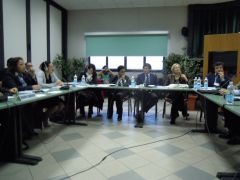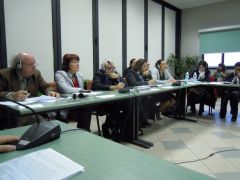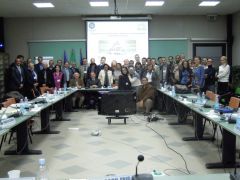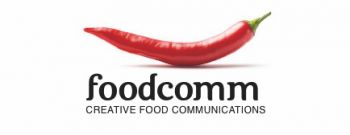CIHEAM-Bari
28-29 November 2011
International technical workshop:
Guidelines for the sustainability
of the Mediterranean diet



The main aim of the technical workshop was to draft indicators for assessing the sustainability of the Mediterranean Diet taking into consideration the definition of sustainable diets and the new Mediterranean diet pyramid: a lifestyle for today (Bach-Faig et al., 2011)1 describing the main features of the Mediterranean diet common to the different Mediterranean food cultures. The indicators will be used to formulate measures to safeguard and promote the Mediterranean diet and to make recommendations for multi-sectoral policy instruments to enhance the sustainability of the Mediterranean agro-food systems and food consumption patterns. The identified indicators could be useful as a model to assess the sustainability of diets in other regions of the world.
Indicators for assessing the sustainability of the Mediterranean diet
The indicators were identified, developed and refined using a multidisciplinary, transdisciplinary and intersectorial approach around the following priority areas: nutrition, health, and lifestyle (e.g. food safety, environment food contamination, food biodiversity, food security, respect of seasonality, etc.); society and culture (e.g. food cultures, traditional knowledge, etc.); economy (e.g. income, employment, etc.); environment (e.g. energy efficiency in food lifecycle, food losses and waste, etc.); and agro-biodiversity.
Enabling policies for enhancing the sustainability of the Mediterranean diet
These identified indicators will be used to design policies in order not only to conserve and preserve the Mediterranean diet, as a common cultural heritage and lifestyle, but also to enhance its sustainability. That requires to develop a set of comprehensive, coherent, integrated and holistic policies that deal with different spheres and arenas of nutrition, health, lifestyle, society, culture, economy, environment; and agro-biodiversity (Fig. 2).
Concluding remarks and way forward
The participants decided to create a “Task Force on Indicators for Assessing the Sustainability of the Mediterranean Diet”. CIHEAM, ENEA, FAO, and CNR expressed their willingness to join it by developing some specific indicators.
The Task Force is open to all organizations and institutions that participated to the workshop and are ready to assume the responsibility to develop indicators for assessing the sustainability of the Mediterranean diet.
CIHEAM-MAIB will constitute a Secretariat for the Coordination of the Task Force that will be based at the CIHEAM-Bari.
The main objective of the Task Force is to develop indicators for assessing the sustainability of the Mediterranean diet. The results and output of the Task Force’s activities will be presented on September 24-25, 2012, in Malta. The presentation will be given in a session of a seminar that will be organised jointly with the 9th meeting of the agriculture Ministers of CIHEAM member countries.
Annex 1. List of participants
The workshop brought together experts (nutritionists, agronomists, economists, social scientists) from many organisations:
-
Anna BACH-FAIG, Scientific Coordinator, Fundación Dieta Mediterránea (FDM), Barcelona, Spain
-
Rekia BELAHSEN, General Secretary, International Union of Nutritional Sciences (IUNS); Professor Training and Research Unit on Nutrition and Food Sciences, Chouaib Doukkali University, Morocco
-
Gianluca BRUNORI, Professor, Laboratory of Agricultural and environmental economics, Pisa University, Italy
-
Barbara BURLINGAME, Group Leader, Nutrition Assessment and Nutrient Requirements Group, Nutrition and Consumer Protection Division, FAO
-
Fabian CAPITANIO, University of Naples “Federico II”, Italy
-
Roberto CAPONE, Principal administrator, Centres International de Hautes Etudes Agronomiques Méditerranéennes (CIHEAM), Mediterranean Agronomic Institute of Bari (MAIB), Italy
-
Gianluigi CARDONE, CIHEAM-MAIB
-
Nicole DARMON, Research director, University Aix-Marseille, France
-
Philipp DEBS, University of Bologna, Italy
-
Sandro DERNINI, Coordinator, Forum on Mediterranean Food Cultures, Rome, Italy
-
Hamid EL BILALI, CIHEAM-MAIB
-
Abderaouf EL FERCHICHI, CIHEAM-MAIB, Italy
-
Maroun ELMOUJABBER, CIHEAM-MAIB, Italy
-
Vincenzo FERSINO, CIHEAM, France
-
Mauro GAMBONI, Agro-Food Department, Italian National Research Council (CNR), Italy
-
Francesco GIARDINA, Project Coordinator, Italian information system on organic farming (SINAB), Italy
-
Habiba HASSAN-WASSEF, Adviser on Nutrition and Health Policy in Development; Member of the Medical Research Council of the National Research Centre, Giza, Egypt
-
Massimo IANNETTA, Head, Sustainable Development and Innovation of the Agro-Industrial System Technical Unit, National Agency for New Technologies, Energy and Sustainable Economic Development (ENEA), Rome, Italy
-
Denis LAIRON, President, European Federation of Nutrition Societies (FENS), University Aix-Marseille, France
-
Giulio MALORGIO, Professor, University of Bologna, Italy
-
F. Xavier MEDINA, Director, Department of Food Systems, Culture and Society, Universitat Oberta de Catalunya (UOC), Barcelona; Coordinator, International Commission on the Anthropology of Food and Nutrition (ICAF)-Europe, Spain
-
Martine PADILLA, Scientific Director, CIHEAM - Mediterranean Agronomic Institute of Montpellier (MAI-M), Montpellier, France
-
Stefano PADULOSI, Senior Scientist, Bioversity International, Rome, Italy
-
Sorry, no records to display.






